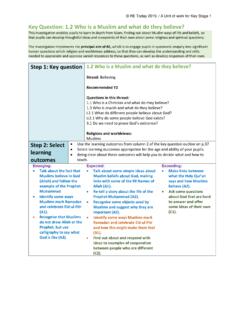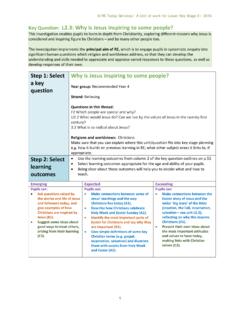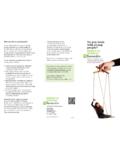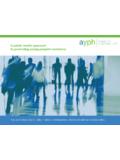Transcription of 1: a
1 RE Today Services / A Unit of work for Key Stage 1/ 2016 1 Key How should we care for others and the world, and why does it matter? This investigation enables pupils to learn in depth from different religious and spiritual ways of life about caring for other people and for the world. Through studying bible stories, the lives of believers such as Dr Barnado, Mother Teresa or a local believer, the Jewish practice of Tzedekah and Sukkot celebrations pupils learn about how beliefs turn into actions for many religious and non-religious people. The unit encourages creativity through the use of art and music. The investigation implements the principal aim of RE, which is to engage pupils in systematic enquiry into significant human questions which religion and worldviews address, so that they can develop the understanding and skills needed to appreciate and appraise varied responses to these questions, as well as develop responses of their own.
2 Step 1: Select a key question How should we care for others and the world, and why does it matter? Year group: Recommended Year 2 Strand: Living Questions in this thread: F6. What is special about our world? What can we learn from religions about deciding what is right and wrong? What matters most to Christians and Humanists? What difference does it make to believe Does religion help people to be good? What difference does it make to believe Is religion a power for peace or a cause of conflict in the world today? Religions and worldviews: Christians and Jewish people (other examples can be selected by the school) Make sure that you can explain where this unit/question fits into key stage planning how it builds on previous learning in RE; what other subject areas it links to, if appropriate.
3 Step 2: Select learning outcomes Use the learning outcomes from column 2 of the key question outlines on Select learning outcomes appropriate for the age and ability of your pupils. Being clear about these outcomes will help you to decide what and how to teach. Emerging Expected Exceeding Talk about how religions teach that people are valuable, giving simple examples (B1). Recognise that some people believe God created the world and so we should look after it (A2). Re tell Bible stories and stories from another faith about caring for others and the world (A2).
4 Identify ways that some people make a response to God by caring for others and the world (B1). Talk about issues of good and bad, right and wrong arising from the stories (C3). Talk about some texts from different religions that promote the Golden Rule , and think about what would happen if people followed this idea more (C2) Use creative ways to express their own ideas about the creation story and what it says about what God is like (C1). Give examples of ways in which believers put their beliefs about others and the world into action, making links with religious stories (B1). Answer the title question thoughtfully, in the light of their learning in this unit (C1).
5 RE Today Services / A Unit of work for Key Stage 1/ 2016 2 Step 3: Select specific content Look at the suggested content for your key question, from column 3 in the unit outlines. Select the best content (from here, or additional information from elsewhere) to help you to teach in an engaging way so that pupils achieve the learning outcomes. This plan has selected the following content to exemplify the learning outcomes. Pupils will: Introduce the idea that each person is unique and important, using Christian teachings that God values everyone (Matthew ); Jesus blesses the children (Matthew 19, Mark 10, Luke 18); Psalm 8 (David praises God s creation and how each person is special in it).
6 Talk about the benefits and responsibilities of friendship and the ways in which people care for others. Explore stories from the Bible about friendship and care for others and how these show ideas of good and bad, right and wrong, Jesus special friends (Luke 5 11), four friends take the paralysed man to Jesus (Luke 5 v 17 26), The good Samaritan (Luke 10: 25 37). Consider the idea that we all have special gifts we can use to benefit others. Learn that some religions believe that serving others and supporting the poor are important parts of being a religious believer Zakat, alms giving, in Islam; tzedekah (charity) in Judaism. Read stories about how some people have been inspired to care for people because of their religious beliefs Mother Teresa, Dr Barnardo; people known in the local area.
7 Having studied the teachings of one religion on caring, work together as a group to create an event a Thank you tea party for some school helpers make cakes and thank you cards, write invitations and provide cake and drink, or organise a small fund raising event and donate the money to a local charity. Look carefully at some texts from different religious scriptures about the Golden Rule and see if the children can suggest times when it has been followed and times when it has not been followed. Talk about how the golden rule can make life better for everyone. Make cartoons to show their ideas. Explore the creation account in Genesis 1 in varied and creative ways, to find out what it tells Jewish and Christian believers about what God is like, and what these stories tell believers about God and creation ( that God is great, creative, and concerned with creation; that creation is important, that humans are important within it).
8 Explore the account in Genesis 2. Talk about ways in which religious believers might treat the world, making connections with the Genesis account ( humans are important but have a role as God s representatives on God s creation, to care for it, as a gardener tends a garden). Investigate ways that people can look after the world and think of good reasons they this is important. Make links with the Jewish idea of tikkun olam (repairing the world) and Tu B shevat (new year for trees). NOTE: This unit of work offers around 8 hours of classroom ideas. You need to select from it in order to achieve the learning outcomes set out in Step 2 above. RE Today Services / A Unit of work for Key Stage 1/ 2016 3 Step 4: Assessment: write specific pupil outcomes Turn the learning outcomes into pupil friendly I can or You can statements.
9 You might adapt these specific outcomes to form I can statements (for pupil self assessment), You can statements (for teacher assessment), and Can statements (for next steps or challenge) Make the learning outcomes specific to the content you are teaching, to help you know just what it is that you want pupils to be able to understand and do as a result of their learning. These I can / You can statements will help you to integrate assessment for learning within your teaching, so that there is no need to do a separate end of unit assessment. Emerging Expected Exceeding I You Can Give simple examples of how people are unique and valuable (B1) Describe how it feels when people are not kind(B1) Give examples of some ways Jewish people care for people and the world(B1) Give an example of what Jesus said about the importance of children (A2) Some people look after the world because God is a creator(A2) I You Can Give examples what Jesus said about the importance of people (A2)
10 Identify two examples of religious believers caring for people(B1) Say what you know about the Jewish practice of Tzedekah (B1) Identify the links between the teaching in the Torah and caring (B1) Give simple reasons why Jesus told the story of the Good Samaritan (A2) Answer questions such as what would it be like if everyone followed the golden rule? (C2) Describe different ideas about what God might be like from reading the creation story(C1) Share their own creative ideas about what the creation story says about God(C1) I You Can Give examples of what believers do as a result of learning from the Good Samaritan and/or Four friends and the paralysed man(B1) Look for similarities and differences between different stories from the bible about caring (B1) Describe how Jewish people might help people making links to the festival of Sukkot (B1) Describe how Mother Teresa or Dr Barnado have put their beliefs into action (B1)














